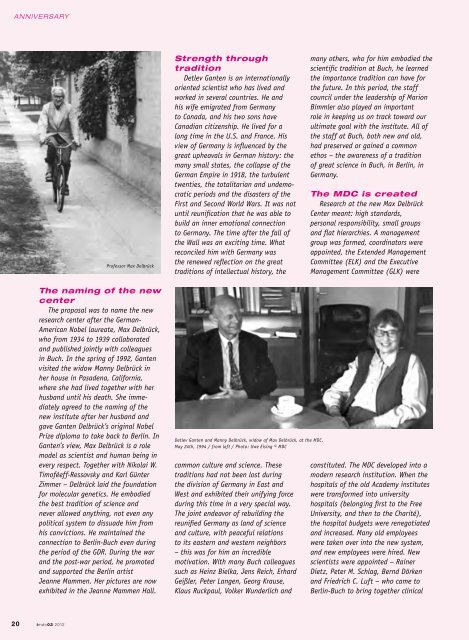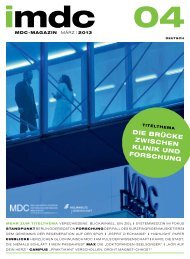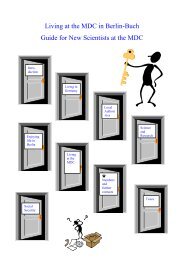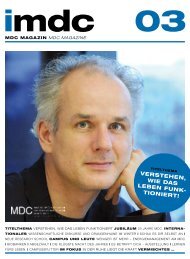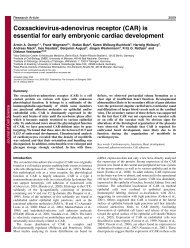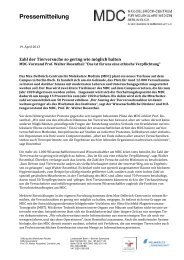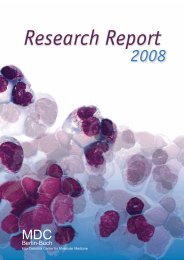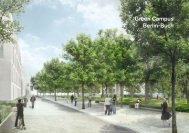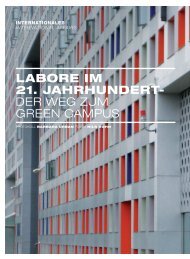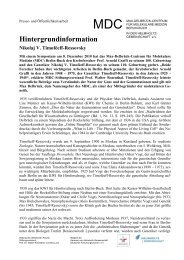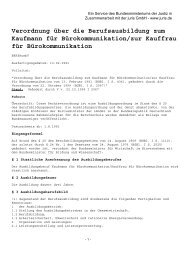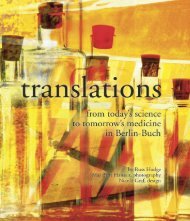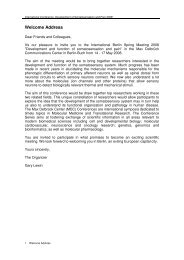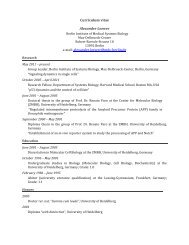iMDC03 zum Download (pdf)
iMDC03 zum Download (pdf)
iMDC03 zum Download (pdf)
Erfolgreiche ePaper selbst erstellen
Machen Sie aus Ihren PDF Publikationen ein blätterbares Flipbook mit unserer einzigartigen Google optimierten e-Paper Software.
anniversary<br />
20 imdc03 2012<br />
Professor Max Delbrück<br />
the naming of the new<br />
center<br />
The proposal was to name the new<br />
research center after the German-<br />
American Nobel laureate, Max Delbrück,<br />
who from 1934 to 1939 collaborated<br />
and published jointly with colleagues<br />
in Buch. In the spring of 1992, Ganten<br />
visited the widow Manny Delbrück in<br />
her house in Pasadena, California,<br />
where she had lived together with her<br />
husband until his death. She immediately<br />
agreed to the naming of the<br />
new institute after her husband and<br />
gave Ganten Delbrück’s original Nobel<br />
Prize diploma to take back to Berlin. In<br />
Ganten’s view, Max Delbrück is a role<br />
model as scientist and human being in<br />
every respect. Together with Nikolai W.<br />
Timoféeff-Ressovsky and Karl Günter<br />
Zimmer – Delbrück laid the foundation<br />
for molecular genetics. He embodied<br />
the best tradition of science and<br />
never allowed anything, not even any<br />
political system to dissuade him from<br />
his convictions. He maintained the<br />
connection to Berlin-Buch even during<br />
the period of the GDR. During the war<br />
and the post-war period, he promoted<br />
and supported the Berlin artist<br />
Jeanne Mammen. Her pictures are now<br />
exhibited in the Jeanne Mammen Hall.<br />
strength through<br />
tradition<br />
Detlev Ganten is an internationally<br />
oriented scientist who has lived and<br />
worked in several countries. He and<br />
his wife emigrated from Germany<br />
to Canada, and his two sons have<br />
Canadian citizenship. He lived for a<br />
long time in the U.S. and France. His<br />
view of Germany is influenced by the<br />
great upheavals in German history: the<br />
many small states, the collapse of the<br />
German Empire in 1918, the turbulent<br />
twenties, the totalitarian and undemocratic<br />
periods and the disasters of the<br />
First and Second World Wars. It was not<br />
until reunification that he was able to<br />
build an inner emotional connection<br />
to Germany. The time after the fall of<br />
the Wall was an exciting time. What<br />
reconciled him with Germany was<br />
the renewed reflection on the great<br />
traditions of intellectual history, the<br />
Detlev Ganten and Manny Delbrück, widow of Max Delbrück, at the MDC,<br />
May 24th, 1994 / from left / Photo: Uwe Eising © MDC<br />
common culture and science. These<br />
traditions had not been lost during<br />
the division of Germany in East and<br />
West and exhibited their unifying force<br />
during this time in a very special way.<br />
The joint endeavor of rebuilding the<br />
reunified Germany as land of science<br />
and culture, with peaceful relations<br />
to its eastern and western neighbors<br />
– this was for him an incredible<br />
motivation. With many Buch colleagues<br />
such as Heinz Bielka, Jens Reich, Erhard<br />
Geißler, Peter Langen, Georg Krause,<br />
Klaus Ruckpaul, Volker Wunderlich and<br />
many others, who for him embodied the<br />
scientific tradition at Buch, he learned<br />
the importance tradition can have for<br />
the future. In this period, the staff<br />
council under the leadership of Marion<br />
Bimmler also played an important<br />
role in keeping us on track toward our<br />
ultimate goal with the institute. All of<br />
the staff at Buch, both new and old,<br />
had preserved or gained a common<br />
ethos – the awareness of a tradition<br />
of great science in Buch, in Berlin, in<br />
Germany.<br />
the mDc is created<br />
Research at the new Max Delbrück<br />
Center meant: high standards,<br />
personal responsibility, small groups<br />
and flat hierarchies. A management<br />
group was formed, coordinators were<br />
appointed, the Extended Management<br />
Committee (ELK) and the Executive<br />
Management Committee (GLK) were<br />
constituted. The MDC developed into a<br />
modern research institution. When the<br />
hospitals of the old Academy institutes<br />
were transformed into university<br />
hospitals (belonging first to the Free<br />
University, and then to the Charité),<br />
the hospital budgets were renegotiated<br />
and increased. Many old employees<br />
were taken over into the new system,<br />
and new employees were hired. New<br />
scientists were appointed – Rainer<br />
Dietz, Peter M. Schlag, Bernd Dörken<br />
and Friedrich C. Luft – who came to<br />
Berlin-Buch to bring together clinical


